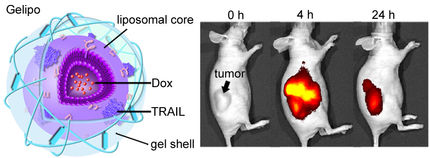Sweet Nanoparticles trick Kidney
Researchers engineer tiny particles with sugar molecules to prevent side effect in cancer therapy
In the past decade nanomedicine has contributed to better detection and treatment of cancer. nanoparticles are several 100 times smaller than the smallest grain of sand and can therefore easily travel in the blood stream to reach the tumor. However, they are still too big to be removed by the kidneys. Since several doses of nanoparticles are necessary to treat a tumor, over time the nanoparticles can accumulate in the kidney and cause irreversible damage. In a study published in Biomaterials, materials scientists at the University of Freiburg led by Prof. Dr. Prasad Shastri from the Institute of Macromolecular Chemistry now present a natural solution to this problem: they built nanoparticles with the carbohydrate polysaccharides, which led to the excretion of the particles.
In nature viruses such as the herpes simplex virus-1 and the cytomegalovirus, which are able to pass through the kidney filtration apparatus despite their large size compared to nanoparticles. Shastri and his team identified that both viruses presents sugar molecules on their surface. Inspired by this observation, the scientists engineered nanoparticles containing polysaccharides. These carbohydrates are frequently found in the human tissue environment. Using a real-time imaging technique, which they have established in their laboratory, the team investigated in a mouse model the fate of these nanoparticles. They observed that the polysaccharide-enriched nanoparticles readily pass through the kidney and are excreted with the urine within a few hours after intravenous administration. The decisive factor for the researchers was that the nanoparticles continued to act as intended and were still able to target tumors.
“The ability to combine tumor accumulation and kidney clearance in the same nanoparticle represents a tipping point in ensuring that nanomedicines can be safely administered” says Shastri. “Our nature-inspired approach enabled us to trick the kidney environment to let nanoparticles pass through” adds Dr. Melika Sarem who was a co-author of the study.
Original publication
Wyss, P. P., Lamichhane, S. P., Abed, A., Vonwil, D., Kretz, O., Huber, T. B., Sarem, M., Shastri, V. P. (2020): Renal clearance of polymeric nanoparticles by mimicry of glycan surface of Viruses. In: Biomaterials 230 (2020) 119643. DOI: 10.1016/j.biomaterials.2019.119643
Original publication
Wyss, P. P., Lamichhane, S. P., Abed, A., Vonwil, D., Kretz, O., Huber, T. B., Sarem, M., Shastri, V. P. (2020): Renal clearance of polymeric nanoparticles by mimicry of glycan surface of Viruses. In: Biomaterials 230 (2020) 119643. DOI: 10.1016/j.biomaterials.2019.119643
Organizations
Other news from the department science
These products might interest you

Eclipse by Wyatt Technology
FFF-MALS system for separation and characterization of macromolecules and nanoparticles
The latest and most innovative FFF system designed for highest usability, robustness and data quality

DynaPro Plate Reader III by Wyatt Technology
Screening of biopharmaceuticals and proteins with high-throughput dynamic light scattering (DLS)
Efficiently characterize your sample quality and stability from lead discovery to quality control

Get the life science industry in your inbox
By submitting this form you agree that LUMITOS AG will send you the newsletter(s) selected above by email. Your data will not be passed on to third parties. Your data will be stored and processed in accordance with our data protection regulations. LUMITOS may contact you by email for the purpose of advertising or market and opinion surveys. You can revoke your consent at any time without giving reasons to LUMITOS AG, Ernst-Augustin-Str. 2, 12489 Berlin, Germany or by e-mail at revoke@lumitos.com with effect for the future. In addition, each email contains a link to unsubscribe from the corresponding newsletter.


















































